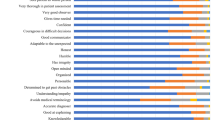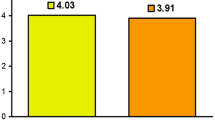Abstract
Objectives: To determine what behaviors patients perceive as reflecting a physician’s humanistic qualities, to develop an instrument for patients to use to assess the humanistic behaviors of their own physicians, and to compare patient assessment of residents’ humanistic behaviors with patient satisfaction and the assessment of attending physicians.
Design: Cross-sectional descriptive study, using patient interviews and questionnaires, and evaluations of residents by attending physicians.
Setting: Inpatient medical service in a tertiary care teaching hospital and in a primary care internal medicine clinic.
Participants: Six medical interns and six medical residents, 119 medical patients in the hospital, and 111 patients in the internal medicine clinic.
Measurements and main results: The 25-item Physicians’ Humanistic Behaviors Questionnaire (PHBQ) was developed from patients’ statements about important humanistic behaviors. The mean PHBQ scores were 4.46±0.22 (mean ± SD, on a scale of 1 to 5) in the clinic and 4.18±18 in the hospital (p=0.003). The Spearman’s rank correlations between the PHBQ and the Medical Interview Satisfaction Scale (MISS) were r=0.8741 (p<0.001) in the hospital and r=0.8751 (p<0.001) in the internal medicine clinic. The Spearman’s rank correlation between the hospital PHBQ and the attending physician evaluations (for the six residents for whom the authors had complete data) was r=0.5753 (p=0.232).
Conclusions: Patients can evaluate the humanistic behaviors of their physicians using the PHBQ. There is good correlation between the PHBQ and patient satisfaction, which supports the validity of the PHBQ. The relative lack of agreement between patients and attending physicians suggests different observations, criteria, or standards. The higher ratings from patients in the clinic compared with those from patients in the hospital suggest that residents’ behaviors are different or that patients have different observations, criteria, or standards in the two settings. Therefore, a complete assessment of residents’ humanistic behaviors may require sampling in both settings.
Similar content being viewed by others
References
American Board of Internal Medicine. Evaluation of clinical competence. Portland, OR, July 1986.
Subcommittee on Evaluation of Humanistic Qualities of the Internist, American Board of Internal Medicine. Evaluation of humanistic qualities in the internist. Ann Intern Med. 1983;99:720–4.
Thompson WG, Lipkin M Jr, Gilbert DA, Guzzo RA, Roberson L. Evaluating evaluation: assessment of the American Board of Internal Medicine resident evaluation form. J Gen Intern Med. 1990;5:214–7.
Herbers JE Jr, Noel GL, Cooper GS, Harvey J, Pangaro LN, Weaver MJ. How accurate are faculty evaluations of clinical competence? J Gen Intern Med. 1989;4:202–8.
Wooliscroft JO, Stross JK, Silva J Jr. Clinical competence certification: a critical appraisal. J Med Educ. 1984;59:799–805.
Butterfield PS, Mazzaferri EL, Sachs LA. Nurses as evaluators of the humanistic behavior of internal medicine residents. J Med Educ. 1897;62:842–9.
Butterfield PS, Mazzaferri EL. A new rating form for use by nurses in assessing residents’ humanistic behavior. J Gen Intern Med. 1991;6:155–61.
Blurton RR, Mazzaferri EL. Assessment of interpersonal skills and humanistic qualities in medical residents. J Med Educ. 1985;60:648–50.
Linn LS, Cope DW, Robbins A. Sociodemographic and premedical school factors related to postgraduate physicians’ humanistic performance. West J Med. 1987;147:99–103.
Linn LS, Oye RK, Cope DW, DiMatteo MR. Use of nonphysician staff to evaluate humanistic behavior of internal medicine residents and faculty members. J Med Educ. 1986;61:918–20.
Kaplan CB, Centor RM. The use of nurses to evaluate houseofficers’ humanistic behavior. J Gen Intern Med. 1990;5:410–4.
Beckman H, Frankel R, Kihm J, Kulesza G, Geheb M. Measurement and improvement of humanistic skills in first-year trainees. J Gen Intern Med. 1990;5:42–5.
Merril JM, Boisaubin EV Jr, Laux L, Lynch EC, Roessler R, Thornby JI. Measuring “humanism” in medical residents. South Med J. 1986;79:141–4.
Linn LS, DiMatteo MR, Cope DW, Robbins A. Measuring physicians’ humanistic attitudes, values, and behaviors. Med Care. 1987;25:504–15.
Klessig J, Robbins AS, Wieland D, Rubenstein L. Evaluating humanistic attributes of internal medicine residents. J Gen Intern Med. 1989;4:514–21.
Biehn JT, Molineux JE. Patient evaluation of physician performance. J Fam Pract. 1979;8:565–9.
Matthews DA, Feinstein AR. A review of systems for the personal aspects of patient care. Am J Med Sci. 1988;295:159–71.
Matthews DA, Sledge WH, Lieberman PB. Evaluation of intern performance by medical inpatients. Am J Med. 1987;83:938–44.
Matthews DA, Feinstein AR. A new instrument for patients’ ratings of physician performance in the hospital setting. J Gen Intern Med. 1989;4:14–22.
Wolf MH, Putnam SM, James SA, Stiles WB. The Medical Interview Satisfaction Scale: development of a scale to measure patient perceptions of physician behavior. J Behav Med. 1978;1:391–401.
SPSS Inc. SPSS/PC+. Chicago, IL 60611. 1986.
Arnold RM, Povar GJ, Howell JD. The humanities, humanistic behavior, and the humane physician: a cautionary note. Ann Intern Med. 1987;106:313–8.
Lieberman PB, Sledge WH, Matthews DA. Effect of patient gender on evaluation of intern performance. Arch Intern Med. 1989;149:1825–9.
Merril JM, Boisaubin EV Jr, Cordova FA, et al. Culture as a determinant of humanistic traits in medical residents. South Med J. 1987;80:233–6.
Webster G, PSQ project to-investigators. Final report on the patient satisfaction questionnaire project. Philadelphia: American Board of Internal Medicine, January 1989 draft.
Merkel WT, Margolis RB, Smith RC. Teaching humanistic and psychosocial aspects of care: current practices and attitudes. J Gen Intern Med. 1990;5:34–41.
Cope DW, Linn LS, Leake BD, Barrett PA. Modification of residents’ behavior by preceptor feedback of patient satisfaction. J Gen Intern Med. 1986;1:394–8.
Author information
Authors and Affiliations
Additional information
Received from the General Internal Medicine Service, Fitzsimons Army Medical Center, Aurora, Colorado.
This work represents the private views of the authors, and does not necessarily represent the official views of the Department of Defense or the U.S. Army.
Rights and permissions
About this article
Cite this article
Weaver, M.J., Ow, C.L., Walker, D.J. et al. A questionnaire for patients’ evaluations of their physicians’ humanistic behaviors. J Gen Intern Med 8, 135–139 (1993). https://doi.org/10.1007/BF02599758
Issue Date:
DOI: https://doi.org/10.1007/BF02599758




